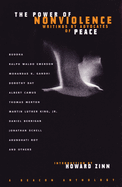 The thirteenth chapter of The Power of Nonviolence: Writings by Advocates of Peace contains Erich Fromm‘s 1960 essay The Case for Unilateral Disarmament. Fromm was a psychoanalyst and a member of the Frankfurt School. He co-founded the anti-nuclear organization SANE, which as named after his 1955 book, The Sane Society. SANE is now part of Peace Action.
The thirteenth chapter of The Power of Nonviolence: Writings by Advocates of Peace contains Erich Fromm‘s 1960 essay The Case for Unilateral Disarmament. Fromm was a psychoanalyst and a member of the Frankfurt School. He co-founded the anti-nuclear organization SANE, which as named after his 1955 book, The Sane Society. SANE is now part of Peace Action.
Like Muste and Wallace, Fromm argues that the safest path to security is unilateral disarmament. Not surprisingly, Fromm approaches the discussion from a psychological perspective. To start with he pushes aside the question of whether disarmament is unilateral or mutual. Instead, he reaches for the question of what the reaction of the opposing side will be to disarmament. He rather dryly states that
it is unfortunately true that political leaders can rarely be trusted
Fromm’s purpose is not to demonize political leaders; he argues that the human nature causes them to bifurcate their personal moral beliefs from their morality as institutional leaders. He finds Hitler to be personally immoral, but the Russian [sic] leaders to be moral in their personal beliefs.
 Just as Fromm criticized Freud’s theories for being warped by cultural misogyny, I would caution us to be aware of our own myopia before accusing the other of being immoral in their political actions. Often the actions of the other are a rational, moral defense to our inability to recognize the threatening nature of our actions. For instance, the Soviets placed nuclear missiles in Cuba after the US placed nuclear missiles in bordering Turkey. Or a more recent example of Iran continuing with anti-US saber-rattling because the US has filled the countries surrounding Iran with US military bases.
Just as Fromm criticized Freud’s theories for being warped by cultural misogyny, I would caution us to be aware of our own myopia before accusing the other of being immoral in their political actions. Often the actions of the other are a rational, moral defense to our inability to recognize the threatening nature of our actions. For instance, the Soviets placed nuclear missiles in Cuba after the US placed nuclear missiles in bordering Turkey. Or a more recent example of Iran continuing with anti-US saber-rattling because the US has filled the countries surrounding Iran with US military bases.
I also have difficulty with excusing the immoral actions of political leaders. I have too often experienced this “lesser evil” mindset, and find that in the long-term it only leads to a greater evil.
Returning to a psychological perspective, Fromm diagnoses the US foreign policy as suffering from a paranoid delusion. The US is constantly focusing on the possible negative outcome, no matter how unlikely, instead of the sane focus on probabilities. I hesitate to accept this differentiation as being entirely objective. Too often the US political leaders couch the sane course as too improbable to even discuss.
I do like how Fromm attacks the mischaracterization of a unilateral disarmament position. He has found that unilateral disarmament has be mislabeled as “submission and resignation” or “cowardice or surrender” He finds the unilateral disarmament to be “an act of courage and resistance” The same analysis can be applied to pacifism overall. Fromm finds it as likely that nonviolent resistance will repel an attack as will violent resistance. And he finds that nonviolent action to be more likely to save democracy than the use of “thermonuclear weapons.”
Fromm takes on the theory of Mutual Assured Destruction (MAD) and its supposed basis in Christian theology that life can only exist in the willingness to die. He honors the idea that the willingness to die must exist in resistance, including nonviolent resistance, but he does not acceptance the need to die because of
the results of stupidity and lack of imagination, with the willingness to stake the future of mankind on a gamble.
Fromm’s life-long emphasis on free will makes his explanation of why unilateral disarmament is not “soft of communism” particularly elegant. His finds the weakness of the communist state to be in its emphasis on the primacy of the state while the power of the democratic state is the primacy of the individual. Unilateral disarmament moves the power of the fate of humankind from the weapon controlling state apparatus back to the individual, thereby undercutting the theory of the communist state.
Fromm admits the risk in unilateral disarmament, but he saw the countervailing risk of world-destroying nuclear war as making it
imperative to shake off the inertia of our accustomed thinking, to seek for new approaches to the problem, and above all, to see new alternatives to the present choices that confront us.
Related articles
- Nonviolence: Muste’s Getting Rid of War (peacecouple.com)
- Camus’ Neither Victims nor Executioners: The World Speeds Up(peacecouple.com)
- Camus’ Neither Victims nor Executioners: Toward Sociability (peacecouple.com)
- Camus’ Neither Victims nor Executioners: A New Social Contract(peacecouple.com)
- War, Peace and Sunshine: Peace Song for 3/12/2012 (peacecouple.com)
- Albert Camus’ Neither Victims nor Executioners: The Self-Deception of Socialists(peacecouple.com)
- Camus’ Neither Victims nor Executioners: Parody of Revolution (peacecouple.com)
- Wallace’s Are We Only Paying Lip Service to Peace? (peacecouple.com)

